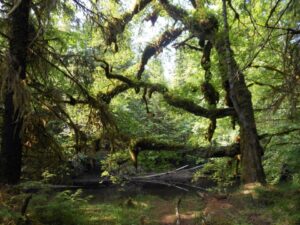 Vancouver – Five forestry companies and three leading environmental groups have agreed on recommendations for a world-class conservation plan to protect and sustainably manage BC’s Great Bear Rainforest, the largest coastal rainforest in the world.
Vancouver – Five forestry companies and three leading environmental groups have agreed on recommendations for a world-class conservation plan to protect and sustainably manage BC’s Great Bear Rainforest, the largest coastal rainforest in the world.
Established in 2000 and dubbed the Joint Solutions Project (JSP), the collaborative effort has already positively influenced land-use planning and reduced conflict over logging throughout the region.
The latest recommendations would implement ecosystem-based management throughout the region, affecting the scope of future logging along BC’s central and north coasts, while ensuring extensive conservation measures to protect the area’s natural ecology.
The joint recommendations, which have been provided to the BC government and First Nations at their request, are the culmination of years of intensive collaborative work, informed decision-making and science-based analysis. They represent another key step in the landmark Great Bear Rainforest Agreement, announced in 2006, and endorsed by the provincial government, First Nations, environmental groups and forest companies.
“It’s not every day that environmental groups and big forestry businesses put forward joint recommendations that are good for the forests and fair to the forest sector in the region,” said Valerie Langer, ForestEthics Solutions on behalf of Greenpeace and Sierra Club BC. “There is a lot of anticipation from around the world to see this model succeed.”
Environmental members in the JSP, ForestEthics Solutions, Greenpeace and Sierra Club BC, have put past conflicts behind them in an effort to work toward positive solutions alongside traditional foes in the BC forestry industry. The forestry companies involved in the agreement – Catalyst Paper Corporation, BC Timber Sales, Howe Sound Pulp & Paper, Interfor and Western Forest Products — have also banded together to form the Coast Forest Conservation Initiative (CFCI), which seeks new approaches to forest conservation and management in the region.
However, the BC government and First Nations are the ultimate decision-makers regarding implementation of the agreement, which will protect the rainforest while at the same time improving social, cultural and economic well-being.
“Collaboration has been the cornerstone in this significant achievement,” said Ric Slaco, CFCI chair and Interfor’s vice president and chief forester. “We are committed to supporting the Province and First Nations as they begin the complex analysis and detailed discussions needed to complete the final chapter of this historic agreement.”
Related articles

Discover more from thegreenpages
Subscribe to get the latest posts sent to your email.






